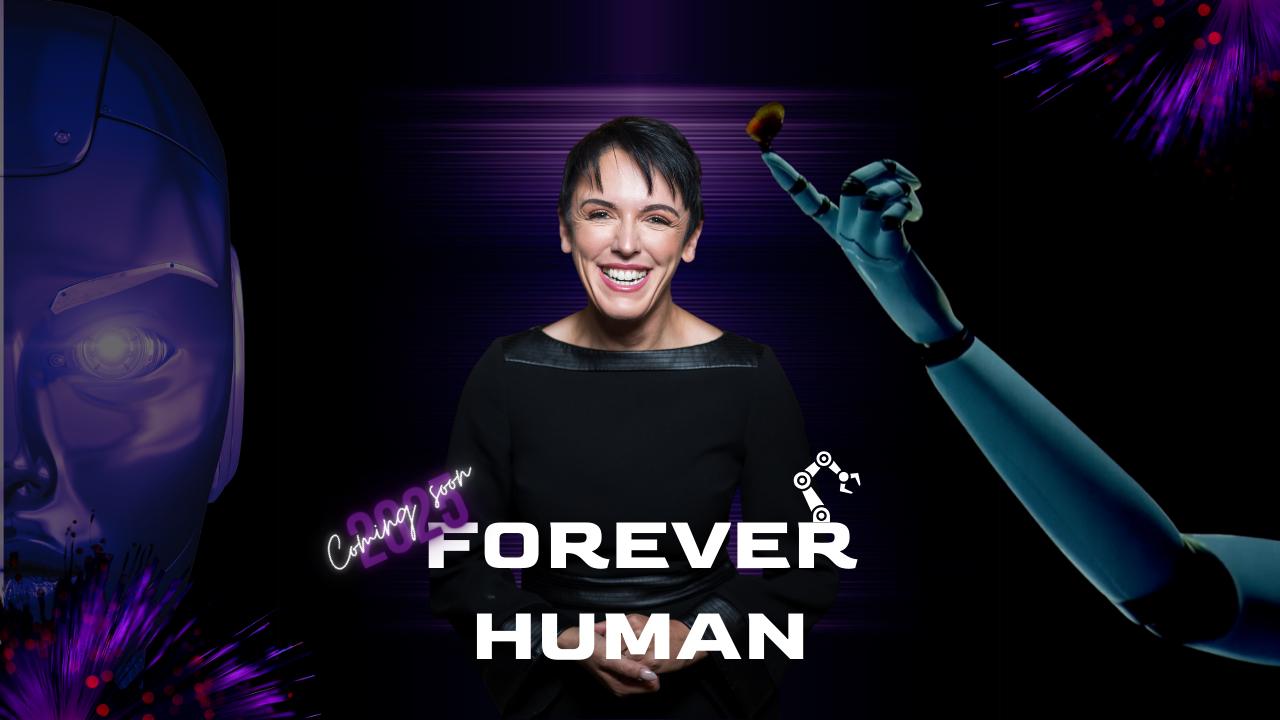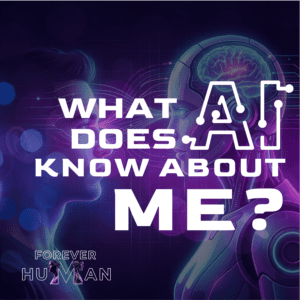Are You Overusing AI and Undermining Your Reputation?
Artificial intelligence is everywhere these days, changing the way we communicate, create, and connect. Tools like ChatGPT, Claude, Jasper—powered by advanced machine learning— and a host of others are shaking up how we write emails, craft content, and get through our to-do lists. But here’s the big question: What happens if you rely on AI too much? Are there consequences and risks of AI overusage that we haven’t fully considered yet?? While these tools can save time and make life easier, they can also cost you something important—your authenticity, your personal touch, and the quality of how you communicate—and that can a profoundly impact how you’re perceived.
KEY TAKEAWAYS
- AI is a fantastic helper, but overusing it too much can take away the authenticity and personal touch that makes your communication meaningful.
- Overusing AI can leave your messages sounding robotic, generic, or repetitive.
- The way you communicate shapes how people perceive you; overly automated content can chip away at your credibility.
- Knowing when to use AI—and when not to—helps you protect your unique voice and professional reputation.
- Let AI handle the boring stuff so you can focus on creating messages that resonate and reflect your individuality.
The AI Advantage: Why We Use It
AI has become a go-to tool for so many of us because, let’s face it, it makes life easier. It’s great at handling the repetitive stuff that eats up time—like writing quick emails, drafting reports, or brainstorming ideas. It saves us from staring at a blank screen for hours.
What makes AI so popular is how easy it is to use. You don’t have to be a tech genius to get the hang of it. Pretty much anyone can jump in and get results. Need a catchy headline? Done. Stuck on how to structure a blog post? AI’s got you covered. And AI isn’t just about speed. It’s also about consistency. It can help keep your tone and style on-brand (supposedly), even when you’re juggling a million deadlines.
But here’s the catch: When you rely on it too much, you risk losing what makes your communication uniquely you. Instead of helping, it can hurt—making your messages feel flat or too polished to feel human. The real danger lies not in the tool itself, but in the blind overreliance on it.
AI is a great tool for solving problems—until it becomes the problem.
Sylvie di Giusto
What Happens If You Rely on ArtificiaI Intelligence Too Much? The Subtle Clues
A | GENERIC PHRASES:
These are the cookie-cutter lines that sound nice at first but don’t actually say much. Things like:
- “In today’s rapidly changing world…”
- “In the ever-evolving field of…”
- “As we navigate this transformative era…”
- “The possibilities are truly endless…”
- “Now, more than ever…”
- “In the fast-paced landscape of…”
- “Harnessing the power of…”
- “Revolutionizing the way we…”
- “Holds a significant…”
- “In the modern world…”
- “At the intersection of…”
- “The next level…”
- “Casting long shadows…”
- “An unwavering commitment…”
- “A pivotal role in shaping…”
- “I’m thrilled…”
- “In conclusion…”
- “Ultimately,…”
- “An indelible mark…”
- “Consequently,” “furthermore,” “moreover,” and “in addition to” to connect ideas.
- and many more.
B | REPETITIVE PATTERNS:
AI tools tend to recycle the same kinds of phrases, which makes your communication sound predictable and boring. For example:
“In today’s world,…” / “In today’s fast-paced world,…” / “In the world we live in today,…”
These phrases are so overused they’ve become almost invisible. They might set the stage for your point, but they’re forgettable because they’ve been heard a million times before.
“It is essential to understand that…” / “It is important to note that…” / “It is crucial to recognize that…”
These lines might sound like you’re adding weight to your point, but they don’t really say anything. They’re filler phrases that don’t move the needle, especially when repeated.
“Harnessing the power of…” / “Leveraging the power of…” / “Unlocking the potential of…”
At first glance, these might sound dynamic, but they’re so predictable they lose their impact. They feel like stock phrases pulled from a corporate brochure, making your writing feel more generic than innovative.
“As we navigate…” / “As we continue to navigate…” / “As we move through…”
These phrases are meant to sound forward-thinking, but when overused, they come across as vague and make it seem like you’re avoiding specifics instead of addressing a challenge head-on.
“The future is bright for…” / “The future holds great promise for…” / “The future of [X] is promising…”
These optimistic lines are great for painting a rosy picture, but they lack any real substance. They leave others wondering, “What exactly is so promising?” without ever delivering a clear answer.
“Driving innovation in…” / “Revolutionizing the way we…” / “Transforming how we…”
These phrases are the bread and butter of innovation keynote speaker, but they’ve been so overused that they’ve lost their edge. When everyone is “revolutionizing” or “transforming,” it doesn’t sound revolutionary anymore.
“In conclusion,…” / “To sum up,…” / “In summary,…”
While these phrases, in theory, are fine for wrapping things up, they’re so formulaic that they will make your conclusion feel robotic. It’s like putting a neon sign that says, “This is the end!” instead of leaving a memorable final impression.
“Unprecedented opportunities…” / “Unparalleled possibilities…” / “Endless opportunities…”
These big phrases sound exciting initially but quickly fall flat because they’re just vague. They make bold promises without any details to back them up.
“Plays a critical role in…” / “Serves as a key factor in…” / “Is essential to the success of…”
These are classic ways to emphasize importance, but they’re so overused they’ve lost their punch. So, unfortunately, they have become so common that they don’t tell anyone anymore why something is actually important.
and many more…
As AI tools continue their rapid development, so too does people’s ability to detect when something wasn’t written by a human.
C | LACK OF EMOTIONAL NUANCE:
AI-generated content can be polished and efficient, but it often stumbles when trying to convey genuine empathy or emotional depth. Why? Because empathy isn’t just about using the right words—it’s about timing, tone, and an understanding of the context that comes from real human experience.
A condolence email written by AI might say, “I’m deeply sorry for your loss. Please let me know if there’s anything I can do to help.” While the words seem appropriate, they can feel hollow if they lack specific, heartfelt touches. A human would likely draw on shared memories, offer a tangible way to help, or include a personal anecdote that makes the message feel sincere and thoughtful.
Overusing AI in such moments can amplify the issue, as reliance on machine-generated text often leads to a one-size-fits-all approach. This strips away the unique emotional connection that is vital in personal and professional interactions.
AI tools often lack the ability to read between the lines or adapt to subtle emotional cues. They can mimic encouragement, but rarely reflect genuine motivation, inspiration, or care that comes from real connection. This can lead to messages that sound generic or misaligned with the recipient’s feelings. An AI-generated congratulatory note might default to something overly formal like, “Your achievement is commendable,” when the moment calls for an enthusiastic and heartfelt, “You crushed it—so proud of you!”
This lack of nuance can make your communication feel detached, especially in sensitive situations where emotional resonance is key. Overusing AI to draft these messages risks leaving the recipient feeling undervalued or unheard.
While AI can replicate the structure of empathetic communication, it can’t replicate the soul behind it. That human touch—the thoughtfulness and emotional insight—is what makes your words truly impactful and memorable. When others pick up on these signs, they’re not just questioning your words—they’re questioning the effort you put into what you’re saying.
Others don’t just notice the words—they notice the effort behind them.
Sylvie di Giusto
Smart AI Use: Avoiding the Perception Trap
It might not surprise you to hear from me that perception is everything. And no, that’s not an exaggeration. How people see you—your credibility, your professionalism, your personality—gets shaped by how you communicate. Every email, every presentation, every text is a chance to tell people who you are.
But when your communication feels robotic, impersonal, or overly automated, you risk losing the trust and respect of the people you’re talking to. You might even damage your reputation without realizing it. Overusing AI can make your messages come across as:
- Inauthentic: Messages that lack a personal touch can make people feel like they’re just another name on a list.
- Lazy: If your words seem copy-pasted, it sends the signal that you didn’t bother to make an effort.
- Disconnected: Repeatedly relying on AI can create a wall between you and others, making your communication feel cold.
- Predictable: When your messages start sounding like a broken record, they lose impact.
- Tone-deaf: AI can miss the tone you need, making a serious email sound too casual—or vice versa.
- Confusing: Without clarity and nuance, your words might leave people scratching their heads.
- Forgettable: If your communication feels canned, it’s hard for people to connect with or remember it.
Balancing the convenience of AI with the need for authentic communication isn’t just smart—it’s essential.
If perception shapes reality, what reality are you creating when your communication feels robotic?
Sylvie di Giusto
Critical Thinking: Shaping the Future of Human Intelligence
The good news? AI isn’t the enemy. It’s just a tool—one that works best when you use it intentionally. So how do you avoid overusing AI and maintain your voice without losing your personal touch or critical thinking skills?
- Use AI as a springboard: Let AI help you brainstorm ideas or organize your thoughts, but take control of the final product.
- Edit and refine: Think of AI as a rough draft, not the finished product. Make it yours by tweaking the tone and adding personal touches.
- Lean into context: Add personal details or anecdotes to make your message feel tailored and genuine.
- Ditch the clichés: Skip overused phrases that scream “AI wrote this” and write in a way that reflects your unique voice.
- Double-check for tone: Before you hit send, ask yourself: “Does this sound like me?” If not, rework it until it does.
- Personalize your AI settings: Many platforms let you customize tone, style, and even add a list of “don’t use” phrases.
When you balance AI’s efficiency with your creativity, your communication will feel polished without losing its human edge.
When AI adds to your voice, it’s powerful. When it replaces it, you lose.
Sylvie di Giusto
Smart AI Use: Avoiding the Perception Trap
AI technologies aren’t going anywhere, and that’s a good thing. But what happens if you rely on AI too much? You risk losing the very thing that makes your communication meaningful: your humanity.
People connect with effort, authenticity, and personality. AI can enhance your voice, but it can’t replace it. So, use these tools to save time or spark ideas, and filter overwhelming volumes of information. But always bring your unique perspective to the table. At the end of the day, the best way to stand out is by being unapologetically human.
And if you’re worried about losing your job to AI, remember this: you only need to worry if you’re letting it do the parts of your job that only a human should do.
In a world full of tools, the greatest one is still you.
Sylvie di Giusto
ACADEMIC RESEARCH
HOT OF THE PRESS
SCIETY | 2024
The AI-Authorship Effect
SPRINGER NATURE LINK | 2024
Negotiating the authenticity of AI
CORNELL | 2023
Do you trust ChatGPT?
The Atlantic
My Deepest Condolences. Signed, ChatGPT
MIT Technology Review
How AI-generated text is poisoning the internet
WIRED
To Fight AI Search Spam, Prioritize Real Human Voices
FREQUENTLY ASKED QUESTIONS
What are the signs that I’m relying on AI too much?
If your emails, posts, or messages all start sounding the same, or you find yourself using a lot of generic phrases, that’s a red flag. Another sign is feedback from others—they might tell you that your tone feels off or impersonal. If people aren’t responding as warmly or enthusiastically as they used to, it could be because your messages are missing that personal touch. Finally, if you’re letting AI handle everything without reviewing or tweaking it, it might be time to take a step back and reassess.
Can readers easily identify my AI-written content?
Yes, and they’re getting better at it day-by-day. AI-generated messages often include repetitive phrases, overly polished transitions, or lack emotional depth, making them feel hollow or mechanical. Others might not consciously know it’s AI, but they’ll notice something’s off—like the tone doesn’t quite match the context or it feels a little too polished. To avoid this, make sure to personalize, edit, and add your unique voice before hitting send.
Can overreliance on AI impact my creative thinking?
Absolutely. If you lean on AI too much for ideas or solutions, you might stop flexing those creative muscles yourself. AI is great for brainstorming or sparking inspiration, but it can’t replace the value of your own insights and original thinking. Even the most promising breakthroughs in the AI space are still reliant on the creativity and discernment of human users. Creativity thrives on exploration and experimenting, which AI can’t do for you. And while AI tools can simulate responses, they don’t possess true cognitive capabilities—the kind that drive human insight, empathy, and adaptability.
Does overusing AI affect my long-term relationships with clients or colleagues?
Yes, it can. People value authenticity and effort, especially in professional relationships. If your messages start feeling too automated or generic, clients and colleagues might see it as a lack of effort or interest. Over time, this can chip away at trust and make it harder to build meaningful connections. To keep relationships strong, make sure your communication feels personal and shows genuine care—something AI can’t fully replicate.
Can AI tools replicate contextual nuances effectively?
Not quite. While AI has come a long way, it still struggles with the subtleties of cultural norms or specific contexts. This can lead to awkward phrasing or even unintentional missteps. For instance, an AI tool might use overly formal language in a situation that calls for a casual tone, or it might miss humor or idiomatic expressions entirely. Always review AI-generated content with the context and audience in mind, and tweak it to ensure it hits the right note.



